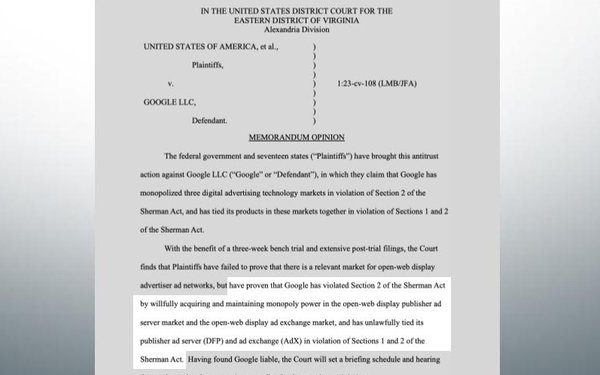Google Harmed Publishers By Monopolizing Ad Tech, Judge Rules
- by Wendy Davis @wendyndavis, April 17, 2025

Google harmed publishers and consumers by monopolizing key components of the market for online display ads, a federal judge in Virginia ruled Thursday.
“For over a decade, Google has tied its publisher ad server and ad exchange together through contractual policies and technological integration, which enabled the company to establish and protect its monopoly power in these two markets,” U.S. District Court Judge Leonie Brinkema said in a 115-page ruling.
“This exclusionary conduct substantially harmed Google’s publisher customers, the competitive process, and, ultimately, consumers of information on the open web,” she added.
The ruling came in a battle dating to January 2023, when the Justice Department and a coalition of states claimed Google “corrupted legitimate competition" by monopolizing markets connected to “open web display advertising” -- essentially meaning programmatic ads served on sites operated by newspapers and other online publishers.
advertisement
advertisement
Antitrust prosecutors alleged in their initial complaint that Google “corrupted legitimate competition in the ad tech industry by engaging in a systematic campaign to seize control of the wide swath of high-tech tools used by publishers, advertisers, and brokers, to facilitate digital advertising,” the complaint alleged.
The government sought monetary damages and a court order that would require Google to unwind its 2008 acquisition of DoubleClick and 2011 purchase of AdMeld.
Brinkema, who conducted a three-week trial last year, specifically found that Google monopolized the “publisher ad server market” and the “ad exchange market,” and also illegally tied its ad exchange to DFP (formerly DoubleClick for Publishers).
She dismissed a claim that Google monopolized the “adveritser ad network” market.
Brinkema noted in her ruling that a prosecution witness, economics professor Robin Lee, testified that in 2022, Google had a 91% share of the “worldwide publisher ad server market for open-web display advertising as measured by the number of impressions served.”
Google unsuccessfully argued that the prosecution's proposed market of “publisher ad servers for open-web display advertising” -- meaning display ads on sites operated by newspapers and other online publishers -- was too narrow. The company contended hat the publisher-related market should also include ads served on social media, streaming video ads and in-app ads.
Brinkema rejected that argument.
“The evidence in the record supports the conclusion that publisher ad servers for open-web display advertising constitute a distinct, relevant market because they are uniquely capable of performing ad-serving functions for websites, which are essential components of news, media, and other online publishers’ businesses,” she wrote.
“Organizations that publish primarily text-based news content online, such as The New York Times or The Wall Street Journal, cannot monetize the primary content on their websites with instream video ads,” Brinkema continued.
“Nor can they feasibly forgo monetizing their websites and publish revenue-generating content only through alternative digital channels, such as via mobile apps or social media pages," she wrote.
Google's Lee-Anne Mulholland, vice president for regulatory affairs, says the company will appeal.
“We disagree with the court’s decision regarding our publisher tools,” she stated. “Publishers have many options and they choose Google because our ad tech tools are simple, affordable and effective.”
The judge plans to hold a hearing in the future on potential remedies.
It's not known whether the Justice Department plans to ask Brinkema to force Google to divest DoubleClick and AdMeld.
Brinkema said in her ruling that the prosecution failed to prove that those acquisitions were anticompetitive, but also said both deals helped Google create a monopoly.
“Although these acquisitions helped Google gain monopoly power in two adjacent ad tech markets, they are insufficient, when viewed in isolation, to prove that Google acquired or maintained this monopoly power through exclusionary practices,” she wrote.
Senator Amy Klobuchar (D-Minnesota), who has introduced antitrust legislation targeting large tech companies, praised the ruling.
“This verdict is an important win for consumers, small businesses and publishers,” Klobuchar stated Thursday. “For far too long, Google has used its dominance in online advertising to squeeze out competition and take revenue out of the pocket of publishers like local news organizations.”
Brinkema's ruling comes one year after a different jurist, U.S. District Court Judge Amit Mehta in Washington, D.C., found that Google violated antitrust law by arranging to serve as the default search engine on browsers operated by Apple and Mozilla, as well as on Android devices. Mehta is expected to hold a trial next week over remedies in that matter.


